I’ve been thinking and talking a good deal about Rick Hanson since my recent break-up. It’s the work I’ve done, that I’ve learned from him, that has made such a deep and profound change in my own healing.
Healing is such a soft sounding word and what I feel is a new sense of being, as though I have a rock inside of myself to lean in and on. I’ve sensed the work was important, changing and helping me transform deep down at the core, in my bones and brain and being that made me feel more connected to my self, hope, and wider humanity.
I felt, actually, like a different me was in the works but it’s not like I had real proof.
Now I do.
I have a way to measure and mark what has mattered in my healing.
Because I’ve had to use the learning, have been tested to see if it sticks.
I went through a break-up two months ago. Am going through it still. It’s not fun. It was a several year’s-long-relationship that has many wonderful aspects. In lots of ways, we were compatible. We loved animals, walks, weren’t big drinkers and are fans of reading and sleep. We are both frugal but not ridiculous. We have lots of past baggage but our bags seemed to match, having been mostly sorted, packed and that too was something we could share.
We liked some of the same shows, meals, and shared similar politics. We had a habit of going together to open houses and checking out apartments, even when not looking to move, just for fun. And there were differences that were good. He helped me appreciate nature, birds, walks a bit more. I helped him talk feelings, emotions, and get in touch with old dreams.
We were, in many ways, compatible and complementary.
And yet, not compatible enough to move in together, to build a future together, to “go the distance” so to speak. We both paused when it got to the point of going deeper, living together, or making a formal or legal commitment with the intention of to tether ourselves and lives to each other.
We had different communication and conflict resolution styles, different temperaments, types, attachment styles. There were challenges.
But that stuff seemed stuff we could work through.
Then we hit a deal breaker.
I’m a mother, with a teen, who does attachment style parenting.
He doesn’t have kids and wasn’t sure about step-parenting now or in the future. Or having his time, schedule, and resources revolve around a kid. My kid.
That was something that he had not fully known or realized until we were actually getting closer to moving in together and it wasn’t an idea but got more real. We might not share the same vacations, homes, downtime or even country where we wish to retire.
He may need to do some more world exploring and I’m ready to sink in and rest, travel emotionally and spiritually but from the zip code and heart space, I inhabit now. If I can help it, I’m anchored and not going anywhere for at least a decade.
I’m nesting for midlife and beyond. I want to walk barefoot in my yard and plant flowers. I daydream of tiny houses and writing and the day my daughter has kids of her own (if she chooses that) and I babysit them, take them to the library and park while she works or works out.
Even in my dreamy future, it’s not all about he and I but anchors a lot around family. Even if he was a part of that, it’s not a big enough part for him, and that’s fair.
He gets to have the present and future he wants and needs. I want that for him.
I get to have the present and future I want and need. I want that for me.
Unfortunately, that means we’re not an us while we do so. That means we may be better as friends (too early to know if that will be possible).
And it’s sad because we were building towards something together.
There’s been pain and hurt, disappointment, loss, and tears.
But there’s been no trauma, drama, betrayal. It’s been, all things considered, a pretty typical break-up.
There’s been no scathing self-doubt or self-hate. While it’s been sad, and there is grief and stuff to sort through and figure out, I’ve noticed something.
I’m not in crisis or post-traumatic stress relapse.
I’m going through a break-up, which isn’t fun but is a normal, human experience.
The way I’m doing it is a lot like the way most people do it. Which doesn’t mean it didn’t hurt or make me shore up my supports. Or that I’m not sometimes stuck to my couch like pesky dog hair that is hard to lift.
But I am o.k. I’m mothering, cooking, cleaning and getting to work and occasionally at least working out.
This is a wonderful and a totally new development for me. And to be honest, for the whole first month, I kept thinking, “Maybe it’s a delayed reaction? Maybe it’s going to hit soon? Maybe I’m just in shock?”
For survivors with lots of developmental trauma (aka – ACEs), break-ups can be treacherous, and anything that triggers our attachment systems and old wounds – it’s extra hard and can feel dangerous.
That’s important to realize. It’s common and there are good reasons for that (see the end of this piece, in fact).
But what I have, in the present, that I’ve noticed is something new and different.
A sense of self.
A sense of worth.
Both remained and didn’t get questioned, tossed out or destroyed in a break-up.
I don’t think, “it’s all me, I’m not lovable.” I don’t think, “No one will ever love me. The best days are behind me.”
I know I have myself. I know I have worth and value. In many ways, I’m making some choices. I’m in a break-up rather than feeling a break-up is being inflicted or happening to me.
I don’t think, “I’m being persecuted. I’m being punished. I’m so robbed, again, like always.” I don’t worry that I’m such a burden, need to hide and pretend it’s all good and easy and put on a happy face or ignore friends and family. I know my supports are there and will be there, even if I’ve too exhausted to reach out right now.
That’s huge.
What a bounty to feel and expect to be loved by those I trust and know care about me.
There have even been blessings, like my own step-father sharing how much step-fathering has enriched his life (WOW!) which is something I’d never heard before.
But mostly, the blessing is this.
I still have my life and myself and am happy enough with both of those things.
This would have seemed impossible in my early healing days – out of the question impossible.
I feel decent about my mothering, my loved ones, my work, animals, and flowers.
I 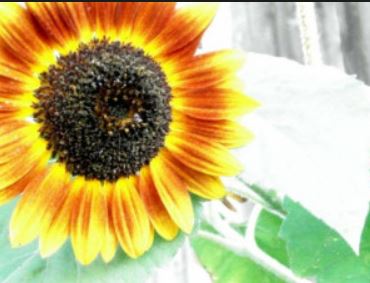 am happy my daughter and I will be volunteering together at a food and pet supply pantry (I didn’t know that many people will go hungry to feed pets, or will surrender animals that can’t be fed, and neither is ideal for wellness and health). Anyhow, there are still things to learn and to do, people to connect with, and local support and bounty to be reminded of, in case we ever need help with food or pet supplies.
am happy my daughter and I will be volunteering together at a food and pet supply pantry (I didn’t know that many people will go hungry to feed pets, or will surrender animals that can’t be fed, and neither is ideal for wellness and health). Anyhow, there are still things to learn and to do, people to connect with, and local support and bounty to be reminded of, in case we ever need help with food or pet supplies.
To be in a break-up, and still have new things to feel, do and look forward to, to have hard days but not to be 24/7 orbiting, is amazing.
It’s good to feel “good enough” inside.
It makes me so happy and hopeful that growth is ongoing, continual, and that even me of today has more tools and support and knowledge than the me of ten years ago.
Too often, we talk of trauma survivors and those with high ACEs as though we are nothing more than failed prevention, the after effects and impact of what went wrong before. We are even, sometimes, the worst-case scenario, the examples of what goes bad after abuse, neglect, etc. Instead of our pain and trauma being prevented, sometimes we are talked about as though our lives and struggles should have been prevented, that we are just the cautionary tales.
We are more than that. There are many of us. We grow, learn and change. We are capable, always, of more health, hope, and wellness. We have so much to share and can share, first-person testimony about what helps and does not, what works and could work better.
Because we know.
Hanson’s work has helped me and my healing. I found online after decades of traditional and often “evidence-based” approaches helped me understand why I hurt so much but not how to change. Much of his work is free on SoundCloud, Facebook or via newsletters. That matters because not everyone has insurance or likes or trusts medical professionals.
His books are less than $20 bucks. For me, a friend and I practiced some of his suggested tools and ways to reframe experiences. We checked in once a week, to make it more real. It was wild to notice the brain’s bias towards bad, and how many things we both ignored, in emails, conversations and daily life, how many compliments, good experiences or luck we minimized and didn’t savor or appreciate. We dismissed or argued with good fortune or compliments, rejected offers of help or appreciation, and failed to notice how often and predictably whatever storm, travel, personal issue we worried over actually never happened or materialized.
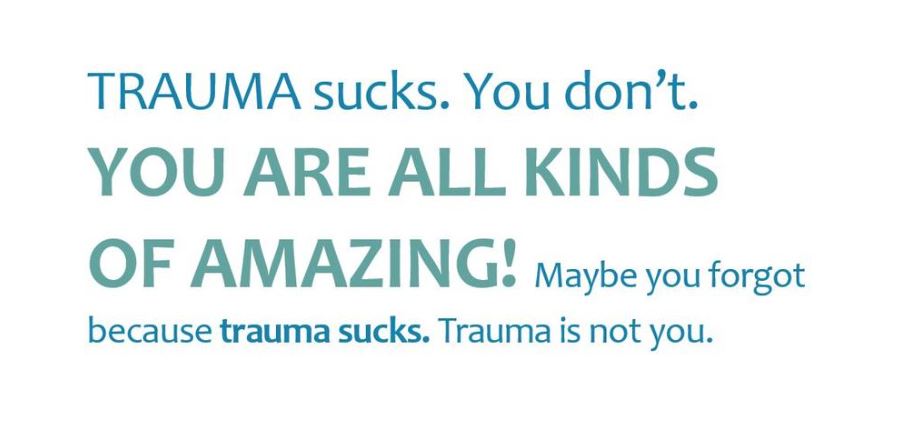
That was a HUGE and important process. We literally took a look at what was sticking to our brains and what we were letting slip away (the yellow stickies).
And it was actually fun because we were becoming detectives scanning our environments for evidence of all that did not suck. This is the often missed step required before one can be grateful.
Many of us have to learn to notice more than threat and danger before we can get all gooey and grateful about the good. Many of us feel like there’s not a lot of good. And to be sure, when in crisis, or threat, sometimes we need all resources to go to getting safe. The tools work best for those of us who may not feel safe even if we are, because we’re living in our bodies which have lots of old experiences of difficulty, danger, and life being dire.
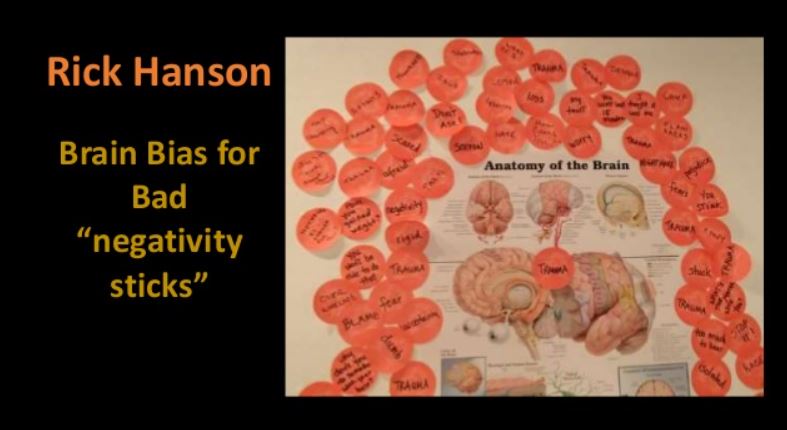
My friend (hey Margaret) and I first started to notice, then acknowledge, record, share and savor the good stuff. We also made little stickers of all the negative stuff we were quick to come up with. We were both shocked to find out how much negative there was and how easy it was to access and how hard it was to even remember the good stuff, in the recent past or overall.
We learned HOW to change by practicing change together.
Now, I feel like a person who stalks joy, who has trained my radar to notice bounty, plenty, all the good even when things are not perfect, even when I’m alone.
Now, even as I write my losses and pains and frustrations in my journal I also notice who and what I have going for me, and the lessons I’m learning that is helpful for me, for my daughter, and maybe even other survivors.
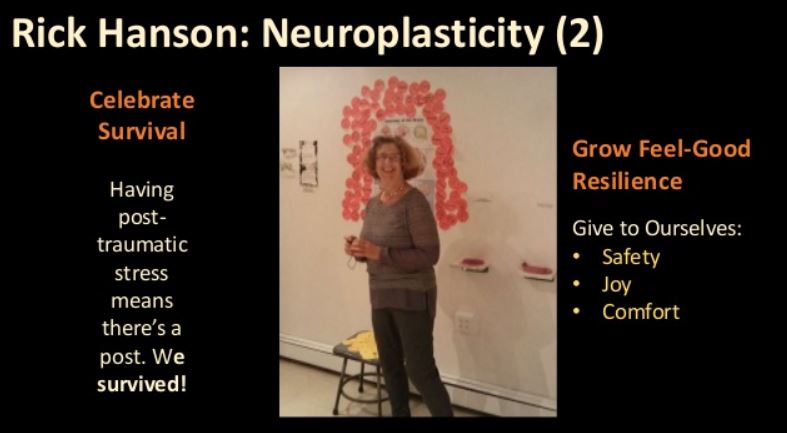
I found Hanson’s work during my divorce, the ending of a 19-year relationship that was actually pretty dramatic, traumatic, and hard for many reasons. Then, I was in divorce hell, a worried mom, and also revisiting all the unresolved stuff of early trauma, even the stuff I thought I’d had all buttoned up. It was hard times.
Little helped me. Little brought comfort, relief or hope. I was not drawn to Hanson’s work early on but more in desperation. It’s pretty serious when a creative, agnostic writer turns to science and Eastern-inspired Buddhism-related work. It’s not every day this feminist is open to hearing another white guy talking about hope. Sometimes, for me that gets a hard no NOPE because of what is often ignored or overlooked about the wider world that remains unfair – how and why for many of us it’s still, some or all of the time, even when we get to adulthood.
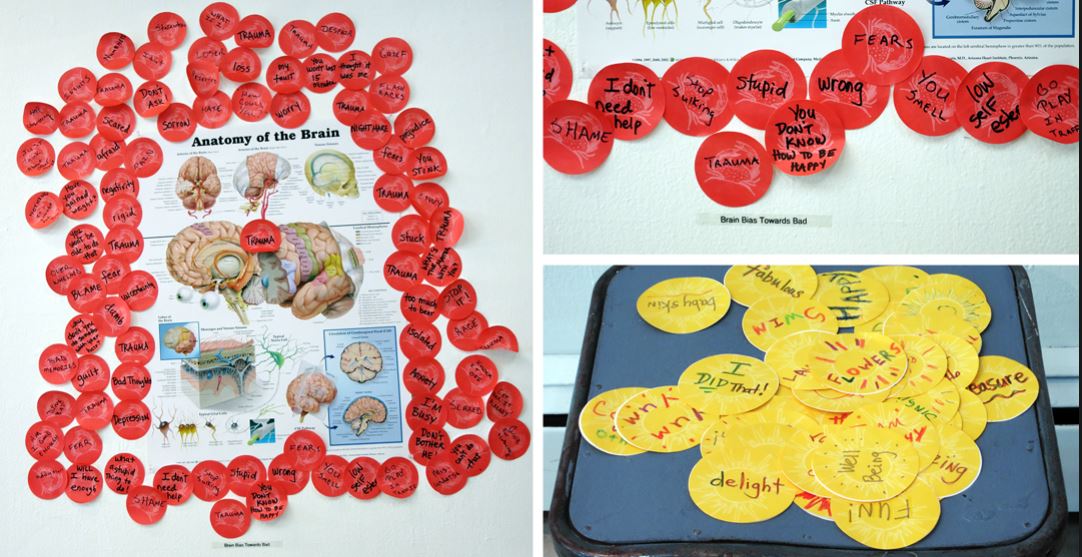
But, Hanson is humble, down-to-earth, accessible and talks to and about survivors of PTSD in a way that is rare. He acknowledged things aren’t the same for all, totally fair, and safety, in real time, matters.
He won me over. His work got in and under my skin, in my eyes and ears and brain and helped me look differently, hear differently, feel differently, towards my own history, past, patterns, and the way my brain managed my life.
He helped give me pride about my brain’s strong need for survival and how remarkable (not pathological) that is.
He helped me understand where and how my anxiety came from and that it wasn’t some personality flaw, but a combination of wiring and evolution and personal history.
And that there were things I could do to shift, change and course correct.
Thank goodness.
Now, I’m pulling out those tips and tricks again to help myself weather a transition.
I’m grateful for Hanson, and others like him, like Belleruth Naparstek, that remain incredibly affordable and accessible. They are smart and could be doing science and research, speaking only to other academics at colleges and conferences, but they are not. They work to bring ideas that help ordinary people, civilians and soldiers with traumatic stress alike, to the mainstream where most of us live and are.
I’m grateful for hope and help and the changes in me, that has been nurtured and tended to over years, which keep paying off.
It feels miraculous at times. “Is that what normal hardship is like?” I recently asked one of my best friends, “where you feel terrible but still feel loved and o.k.?”
She smiled. Basically.
“It really is easier to live this way,” I told her. it made me feel compassion for the me who had not felt worthy or supported, inside or out in the world for a good chunk of my life.
I feel what one of my favorite writers, another white guy, Raymond Carver, wrote, near the end of his too short (high ACE life), in the poem, Late Fragment.
And did you get what
you wanted from this life, even so?
I did.
And what did you want?
To call myself beloved, to feel myself
beloved on the earth.
Heck yes.
To feel worthy of worth.
To feel good enough to let goodness in.
To help our brains get trained to notice, scan, accumulate and be supported by bounty.
I can return to what works, what helps, what strengthens and take in the parts of the neuroplasticity of the brain that speak to me and can be practical. Because, to be clear, sometimes all the talk of the brain seems to forget that people the brains are actually in and that is not fun or useful reading – at least not for me.
My daughter and I are watching the sunflowers grow. We have a spot, by the brick fireplace wall, in our driveway. We count how many bricks high the sunflowers grew.
They are growing, brick by brick, day by day, and being fed by the sun. They reach up and out and keep going. We are not missing it, even now. We are noticing. We are waiting. Will they be shorter, taller, bloom earlier or later than the ones we’ve planted in other years? We don’t know yet.
It’s the first time we’ve planted sunflowers in this house. But we will find out because we are tracking the growth, enjoying the process.
I have Hanson to thank for that and my own self as well for being willing to change and try new ways and things. I hope it’s a way of being more familiar to my daughter. It is, I think, what survivor and parent advocate Jocelyn Goldblatt means when she talks about “the intergenerational transmission of healing.”
I’m all for that.
Here is a summary of the work of Hanson that I’ve found most helpful. It’s described in his own words (and I’ve paraphrased) as he’s interviewed by Victor Furhman “the voice” of Destination Unlimited. He shares a bit about his own childhood and what has launched his own growth and professional work, which is interesting. The Q&A I paraphrased below is the summary of the concepts that have been most helpful to my post-traumatic growth, to restoring my worth after a lot of adversity in childhood. When I’m in grief or pain, I find it easier to listen and hear words than to read a book so I offer a soundbite here. Maybe it will speak to you as well. Link here to the whole interview. Excerpt below.
Q)Why many people so readily extend kindness and compassion to others and yet deny themselves the same?
A)I think it’s for multiple reasons.
- Part of it’s cultural, in general in terms of Western culture, distinct from more Eastern cultures.
- ….Western culture tends to goal directed. If we’ve not attained goals we feel something is wrong with me. I fall short.
- Personal upbringing.
- Some families are particularly oriented towards criticism, shaming and also perhaps a value on dismissing ones own needs and minimizing them.
- We tend to do to ourselves, as adults, were designed neurologically and through biological evolution, to do to ourselves what others did to us especially when we were young and vulnerable.
- Negativity bias of the brain.
- Negativity bias of the brain. Brain’s negative bias, summarized as a brain that is like Velcro for bad experiences and Teflon for good. In other words, experiences, one after the other, where we felt we blew it, fell short, others were critical, others rejected us or left us, (we think) so well obviously something is wrong with me.
- We tend to accumulate those residues, preferentially, in neural storage, literally hard wired into the body while meanwhile, experiences of worth, accomplishment, deserving good care and attention, of deserving love, of being a decent and good person, those may be occurring but they wash through the brain like water through a siv.They are not that useful in terms of raw survival….
It’s really important to know that each person can implement correction.
Hanson’s website and Facebook pages have links to free stuff, including free newsletters and podcasts. His tools are about helping people “to grow a sense of worth. to authentically grow a sense of worth and deserving of love,” and while his audience is not only trauma survivors, he includes us and directs content directly to us, when he speaks of all people, and that alone is hopeful, helpful, rare, and inclusive.
Note: This blog post has been cross-posted to Heal Write Now.

With my friend Margaret, we did an interactive installation on how trauma feels, at Mobius called Body Language. Margaret is pictured above in the brain slides with the stickies. We wanted to share our exercises and research with others in a conversational and playful way.
This is day 26 of 30 posts afte Oprah on 60 Minutes.
You Matter Mantras
- Trauma sucks. You don't.
- Write to express not to impress.
- It's not trauma informed if it's not informed by trauma survivors.
- Breathing isn't optional.
You Are Invited Too & To:
- Heal Write Now on Facebook
- Parenting with ACEs at the ACEsConectionNetwork
- The #FacesOfPTSD campaign.
- When I'm not post-traumatically pissed or stressed I try to Twitter, Instagram & Pinterest.
Sad to hear of the ‘break-up’ Cissy, but grateful for the wisdom [and pain] you shared in this piece…there is hope, there is healing and you shared some help for others. Thank you, Michael Skinner